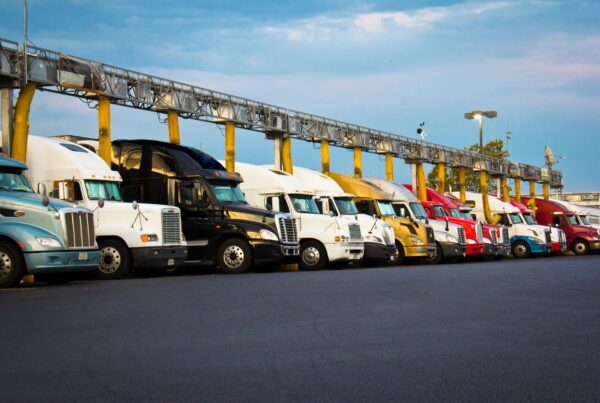According to the Owner-Operator Independent Driver Association (OOIDA), approximately 10% of all truckers in the U.S. are owner-operators (approximately 350,000 truckers). An owner-operator is a truck driver who operates his or her own commercial trucking business rather than working as an employee driver for someone else.
Generally, owner-operators are the sole decision-makers of their independent business and have the freedom to choose what loads they want to haul, when and where they operate their business, and whether they do business with a motor carrier or operate under their own authority, among other things.
The owner-operator model has been the backbone of the trucking industry for decades, but times have changed. The legal landscape in California has shifted significantly since 2018 and the viability of the owner-operator model—motor carriers using owner-operators (independent contractors) to transport freight rather than using company drivers (employees)—is questionable and risky.
A Brief History and Timeline
Established in 1887 to regulate the railroad industry and later expanded to oversee other modes of transportation including trucking, the Interstate Commerce Commission (ICC) regulated the authority to transport cargo and passengers, as well as motor carrier rates and services.
In 1980, the trucking industry experienced major “deregulation” with the passage of the Motor Carrier Act of 1980, which reduced the ICC’s control over rates, routes, and services. The ICC Termination Act of 1995 formally disbanded the ICC, transferred many of its remaining functions to the USDOT, and reinforced federal preemption over state laws regarding rates, routes, and services of motor carriers. This followed from the Federal Aviation Administration Authorization Act of 1994 (F4A), which specifically prohibited states from enacting laws or regulations affecting a motor carrier’s prices, routes, or services, in a manner similar to the deregulation of the airline industry nearly two decades earlier.
Shift in California Law
In April 2018, the California Supreme Court issued a landmark decision in the matter of Dynamex Operations West, Inc. v. Superior Court of Los Angeles (2018) 4 Cal.5th 903. Two delivery drivers alleged that Dynamex, a nationwide same-day courier and delivery service, had improperly classified them and other “similarly situated” drivers as independent contractors. The plaintiffs in Dynamex:
- were paid a flat fee or percentage of the delivery fee received from the customer;
- were generally free to set their own schedules;
- were free to reject or accept jobs assigned by Dynamex;
- used their own cell phones and vehicles for work;
- were free to choose their own routes;
- could perform work for other companies; and
- were hired for an indefinite period of time.
While these facts would likely have weighed in favor of an independent contractor determination under the then-relied upon Borello test (S.G. Borello & Sons, Inc. v. Department of Industrial Relations (1989) 48 Cal.3d 341), the California Supreme Court went in a different direction.
The Dynamex court replaced the multi-factor Borello test, which had been in effect since 1989, and embraced a standard that presumes all workers are employees instead of contractors, placing the burden on the entity classifying a worker as an independent contractor to establish that its classification is proper under the newly adopted “ABC test.”
In September 2019, Governor Newsom signed Assembly Bill 5 into law – commonly referred to as “AB-5”, which codified the “ABC test” first articulated in Dynamex. It went into effect beginning January 1, 2020 (See, Labor Code § 2775).
The ABC Test
AB-5, which codifies the California Supreme Court’s ABC test for independent contractors as set forth in Dynamex Operations West, Inc. v. Superior Court of Los Angeles (2018), was signed into law by Governor Newsom on September 18, 2019. The California Supreme Court ruled in Dynamex that for a worker to be properly classified as an independent contractor, the company must establish that the worker meets the ABC test:
- Prong A: Is the worker free from the control and direction of the hiring entity in the performance of the work, both under the contract for the performance of the work and in fact?
- Prong B: Does the worker perform work that is outside the usual course of the hiring entity’s business?
- Prong C: Is the worker customarily engaged in an independently established trade, occupation, or business of the same nature as the work performed for the hiring entity?
The Preemption Dilemma
In January 2021, the Ninth Circuit Court of Appeal ruled that California’s meal and rest break rules were unenforceable as to truckers carrying goods in interstate commerce, by upholding a federal preemption decision by the Federal Motor Carrier Safety Administration (“FMCSA”). (See, International Brotherhood of Teamsters, Local 2785 v. Federal Motor Carrier Safety Administration No. 18-73488, 2021 WL 139728 (9th Cir. Jan. 15, 2021).) This was a big win for transportation industry employers in California.
A few months later in April 2021, on the exhaust fumes of that earlier preemption victory, the Ninth Circuit, in California Trucking Association v. Bonta (“Bonta”), ruled that there is no federal preemption of AB-5, California’s new independent contractor law.
In Bonta, a three-judge panel of the Ninth Circuit Court examined the F4A (a federal statute which preempts any state law “related to a price, route, or service of any motor carrier . . . with respect to the transportation of property.” 49 U.S.C. § 14501(c)(1).) The Court found, in a 2-1 decision, that in 2020, the United States District Court for California, Southern District (San Diego) had abused its discretion when it enjoined the State of California from enforcing AB-5 against motor carriers doing business in California (on the grounds that such enforcement was preempted by F4A).
In reaching this conclusion, the Ninth Circuit Court determined that AB-5 neither directly nor acutely impacted the “prices, routes or services” of a motor carrier, but rather, was simply a “generally applicable law” which did not effectively “bind” motor carriers to specific prices, routes, or services at the consumer level.
The district court found that, under Prong B of the ABC test, “drivers who may own and operate their own rigs will never be considered independent contractors under California law.” (Cal. Trucking Ass’n v. Becerra, 433 F. Supp. 3d 1154, 1165 (S.D. Cal. 2020) [with Rob Bonta being substituted in the appeal for his predecessor, Xavier Becerra, as California Attorney General].). As the court observed, “the ABC test appears to be rigged in such a way that a motor carrier cannot contract with independent contractor owner-operators without classifying them as employees.” (Id., fn 9, emphasis added.)
This resulted in the ABC test being commonly referred to as the “all or nothing rule.”
The district court concluded, “there is little question that the State of California has encroached on Congress’ territory by eliminating motor carriers’ choice to use independent contractor drivers, a choice at the very heart of interstate trucking.” Hence, the injunction was issued in 2020.
With the district court ruling overturned by the Ninth Circuit in 2021 and the injunction lifted in the summer of 2022 when the U.S. Supreme Court denied the California Trucking Association’s (“CTA”) petition for certiorari, the State of California’s anticipated enforcement of AB-5 (and the ABC test) will effectively compel a motor carrier to use employees for most services because, under the ABC test, a driver providing a service within an employer’s usual course of business could never be considered an independent contractor.
In his dissent, Circuit Judge Bennett found this to be self-evident: “independent-contractor truckers hauling goods for the hiring entity are perforce not performing work outside the usual course of the hiring entity’s business, which is, of course, hauling goods.” Thus, as the district court correctly found, motor carriers would have to “reclassify all independent-contractor drivers as employee-drivers for all purposes under the California Labor Code, the Industrial Welfare Commission [(IWC)] wage orders, and the Unemployment Insurance Code.” (Id., at 1166.)
Our analysis of the ABC test, as codified in section 2775 of the California Labor Code, means that AB-5 will effectively eliminate motor carriers’ use of owner-operators to accommodate fluctuations in supply and demand, especially given that California’s Industrial Wage Commission (“IWC”) Order No. 9-2001(9)(B), applicable to the Transportation Industry, requires employers to supply their employees’ tools and equipment.
Prong B of the ABC test is the primary hurdle for trucking companies using owner-operators because the usual course of a trucking company is transporting freight, and transporting freight is the work an owner-operator is typically hired to perform. If a trucking company cannot satisfy Prong B, it will not be able to satisfy the “all or nothing” ABC test.
What Does this Mean for Trucking Companies Using Owner-Operators?
Until and unless the state of the law in California changes, trucking companies using owner-operators (independent contractors) in 2024 should consider the following options:
- Transitioning their CDL driver workforce from owner-operators to company drivers.
- Exploring the viability of the business-to-business exemption under Labor Code Section 2776.
- Creating a broker entity, i.e., a separate legal entity with “broker” authority from the FMCSA, to conduct business with owner-operators.
Regardless of the option chosen, California employers in the trucking industry must carefully examine their personnel, employment practices, and contractual relationships with owner-operators (and other independent contractors) to ensure compliance with evolving federal, state and local laws and regulations, and perhaps most importantly, consult with legal counsel.





